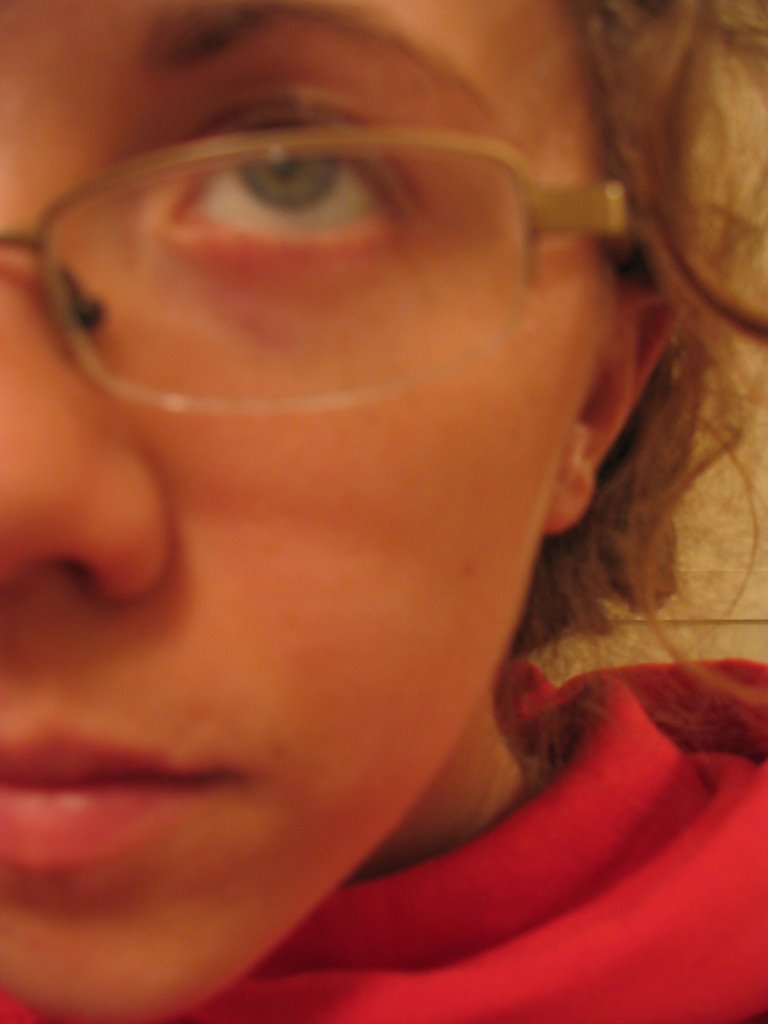So our first day in the anatomy lab was today.
Today I made my first incision into another human body.
It was at once sobering and exciting, this rite of passage, a threshold every future physician has to cross and probably remembers for the rest of her life. It was also just incredibly, utterly cool.
The face, hands and feet--probably the most human parts of any body--were covered with stockings, both to make it easier for us to do what we had to do and to protect them from desiccation.
The body itself was that of an eighty-ish man, who died of complications of heart disease; he was a middling-sized man, not the wasted habitus you sometimes see in old age or advanced infirmity, but not huge. I thank him for his gift to my learning.
We began by cutting flaps of skin on the chest and reflecting them back, then working away the fat until we could see the superficial fascia (tough coverings) on the pectoralis major, serratus muscles, and deltoids. There was a fair amount of fat to cut away from the ribs; we worked a little too far inferiorly and ended up exposing a little bit of the rectus abdominus as well (the abs, for those of you with any passing familiarity with SHAPE magazine et al). I never realized how much fat there is in the average body--not just in a large person, but in a person period. It made me feel a little better about my latest body composition stats. The people with female cadavers sectioned the breasts to get a look at the lobules and such that comprise the milk producing tissue--no one found much, considering that most of the donors were fairly advanced in age and the lactation apparatus etc. sort of atrophies (ie shrivels up) with age--nature is quite parsimonious, and what you don't need you generally don't keep. One group did have a female cadaver with breast implants--I lacked the wherewithal to actually handle one, first because I think breast implants are gross in general, second because (spoiler alert, if you're squeamish skip to the next paragraph) they were covered with grease from the aforementioned abundant fat.
It's difficult to walk the line between remembering that these were once human beings aand as such are inherently due respect and compassion (and depending on your religious and moral bent, still are people--I got called out on this at the Christian Medical Association meeting, where one of the participants 'reminded' me that "They aren't people anymore--the soul has departed, they're corpses." I'll write more on the CMA later--it's not the best fit I could have hoped for, as it seems populated primarily by mainline and right-leaning Protestants that would probably have heart attacks if they knew the extent of my interfaith Episcopal/Quaker/Wiccan/Buddhist hippy-dippiness. However, they're nice folks, and when I go to their meetings they feed me, and the lingo--"glorify the Lord," "the things of the world," "being a witness for Christ"--reminds me of the church I went to in elementary/ middle school, which is simultaneously comforting and kind of painful) and jsut focusing on the anatomy, doing what you need to do, and forgetting for a little while that you're working on a person. Selective attention, I guess you could call it, or selective numbing. You can only focus on so much, and while of course I never want to treat anyone or any body (pun intended) I meet as just a hunk of flesh, for the purposes of this course I think I'm going to have to depersonalize the cadaver, at least a little, at least for a while.
Subscribe to:
Post Comments (Atom)

2 comments:
when my friend went through this lab, she named her cadaver. it made her feel better for some reason. plus its kind of funny. i have a weird and gross sense of humor-obviously.
I too am an interfaith bod - on the same lines as you described.....queer.....death involved poetic artistic.......so I loved the fact that I stumbled upon your blog.
I especially love the poems written around dissection.
would love to be able to discuss this subject more with you...
All the best
hope you are progressing well! I will read newer posts to find out, but it is the early days that interest me and the emotions that you report......
Post a Comment